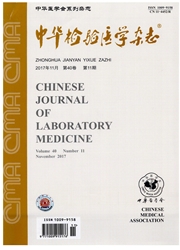

 中文摘要:
中文摘要:
我国是HBV感染和肝细胞癌(HCC)的高发国家。HCC发病隐匿,进展快,恶性程度高,预后较差。早诊断,早治疗可有效改善HCC患者生存水平。肿瘤标志检测是肿瘤早期诊断、评估预后和监测复发的有效方法。随着蛋白质及分子生物学技术的发展,越来越多的HCC标志被筛选出,如甲胎蛋白异质体、脱-γ-羧基凝血酶原、磷脂酰肌醇蛋白聚糖3、N-糖标志物、HCC易感基因、microRNA等,并逐步应用于临床。本文就近年来HCC诊断标志的研发及其临床应用价值作回顾性分析和评侩。(中华检验医学杂志.2013,36:212-216)
 英文摘要:
英文摘要:
Hepatocellular carcinoma (HCC) is one of the most common malignant tumors in China because of high incidence of hepatitis B virus (HBV) infection. HCC is diagnosed at a late stage in most of the cases; therefore the prognosis of patients with HCC is generally poor. Early diagnosis and surgical treatment are of great clinical desirable to improve prognosis of HCC. Tumor marker is an effective means for early diagnosis, prognosis assessment and recurrence monitoring. In addition to alpha fetoprotein ( AFP), Lens culinaris agglutinin-reactive AFP (AFP-L3), des-γ-carboxy prothrombin (DCP), glypican-3, Nglycome markers, candidate-susceptibility genes, microRNAs and several other biomarkers have been revealed as potential HCC markers and will be applied in clinical laboratory gradually. In this review, the efficacies of novel HCC markers and their possible implications for clinical application are described. ( Chin J Lab Med, 2013,36:212-216)
 同期刊论文项目
同期刊论文项目
 同项目期刊论文
同项目期刊论文
 期刊信息
期刊信息
